|
|
|
Sort Order |
|
|
|
Items / Page
|
|
|
|
|
|
|
| Srl | Item |
| 1 |
ID:
168422
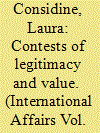

|
|
|
|
|
| Summary/Abstract |
The recently adopted Treaty on the Prohibition of Nuclear Weapons (TPNW) has caused much debate and controversy in global nuclear politics. Given that the stated goal of the TPNW supporters (states and NGOs alike) is to embed the treaty in the structures of nuclear governance and to strengthen its normative power, how likely is the TPNW to achieve these objectives? The article argues that the unique structures of legitimacy and value within which nuclear weapons are enmeshed place particular complications on the normative force of the TPNW as compared to previous humanitarian arms control initiatives, which has implications for the way in which the TPNW can function to consolidate a prohibitionary norm on nuclear weapons possession. The article uses the framing of legitimacy to analyse the complex structures within which the TPNW was adopted and within which it will enter into force, particularly focusing on the TPNW's relationship to the Treaty on the Non-Proliferation of Nuclear Weapons (NPT). The article concludes that consolidation may require a further challenge to the existing structures of nuclear order than state actors have, so far, been willing to make. This work is based on first-hand observations from the TPNW negotiations and interviews with civil society actors at the United Nations in New York in June and July 2017.
|
|
|
|
|
|
|
|
|
|
|
|
|
|
|
|
| 2 |
ID:
168421


|
|
|
|
|
| Summary/Abstract |
This article details the evolution of maritime security from the perspective of its impact on the historical architecture of sea space. It argues that, as the fundamental unit of governance, zoning provides keen insight into the mechanics of maritime security. The article observes that Britain's Hovering Acts in the late eighteenth century represent the earliest example of modern zonation at sea and that they exhibit a shift from early modern territorial claims based on imperium and dominium. The article explores the way these hovering zones shaped the rationale underlying contemporary maritime security. It finds that maritime security has effectively relegated national security to a minor spatial belt of state power, while elevating non-traditional understandings of security to the level of global existential threat. The future of maritime security is under construction. Increasingly segmented by interconnecting, overlapping, multi-functional zones that seek to regulate all free movement and usage of the sea, security developments are reorganizing the maritime sphere. Nonetheless, the article argues, despite the novelty of this development, a historical military logic persists in new formations of security-oriented practices of maritime governance.
|
|
|
|
|
|
|
|
|
|
|
|
|
|
|
|
| 3 |
ID:
168426


|
|
|
|
|
| Summary/Abstract |
Forty years after its publication, Theda Skocpol's States and social revolutions remains the pre-eminent book in the study of revolutions. But how should the book be assessed from the vantage point of contemporary world politics? This essay reviews Skocpol's contribution to three main issue-areas: theory, structural approaches and the international. It argues that, rich as it has been, the research agenda initiated by States and social revolutions has run its course. It cannot respond effectively to the different contexts within which revolutions emerge and the diverse forms they take. Its bifurcation between structure and agency cannot capture the relational character of revolutionary action. And, despite its concern for the international components of revolutions, States and social revolutions cannot accommodate the ways in which revolutions are ‘intersocial’ all the way down. A new Skocpol is needed for a new age of revolutions.
|
|
|
|
|
|
|
|
|
|
|
|
|
|
|
|
| 4 |
ID:
168416
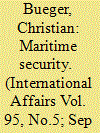

|
|
|
|
|
| Summary/Abstract |
In this introduction to a special section of the September 2019 issue of International Affairs, we revisit the main themes and arguments of our article ‘Beyond seablindness: a new agenda for maritime security studies’, published in this journal in November 2017. We reiterate our call for more scholarly attention to be paid to the maritime environment in international relations and security studies. We argue that the contemporary maritime security agenda should be understood as an interlinked set of challenges of growing global, regional and national significance, and comprising issues of national, environmental, economic and human security. We suggest that maritime security is characterized by four main characteristics, including its interconnected nature, its transnationality, its liminality—in the sense of implicating both land and sea—and its national and institutional cross-jurisdictionality. Each of the five articles in the special section explores aspects of the contemporary maritime security agenda, including themes of geopolitics, international law, interconnectivity, maritime security governance and the changing spatial order at sea.
|
|
|
|
|
|
|
|
|
|
|
|
|
|
|
|
| 5 |
ID:
168423
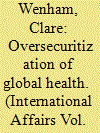

|
|
|
|
|
| Summary/Abstract |
Linking health and security has become a mainstream approach to health policy issues over the past two decades. So much so that the discourse of global health security has become close to synonymous with global health, their meanings being considered almost interchangeable. While the debates surrounding the health–security nexus vary in levels of analysis from the global to the national to the individual, this article argues that the consideration of health as a security issue, and the ensuing path dependencies, have shifted in three ways. First, the concept has been broadened to the extent that a multitude of health issues (and others) are constructed as threats to health security. Second, securitizing health has moved beyond a rhetorical device to include the direct involvement of the security sector. Third, the performance of health security has become a security threat in itself. These considerations, the article argues, alter the remit of the global health security narrative; the global health community needs to recognize this shift and adapt its use of security-focused policies accordingly.
|
|
|
|
|
|
|
|
|
|
|
|
|
|
|
|
| 6 |
ID:
168425


|
|
|
|
|
| Summary/Abstract |
In this article, we examine China's promotion of the renminbi (RMB) in international oil trade and explore its implications for the international currency system in the short and the long term. The article traces the rise of the RMB in international oil trade in recent years and provides an analysis of its impact on the internationalization of the Chinese currency. We argue that despite the increasing use of the yuan in oil trade in recent years, in the short term it is highly unlikely that a petro-RMB system will emerge to rival the petrodollar system. Unlike the petrodollar, which combines the qualities of a master currency, a top currency and a negotiated currency, China lacks the economic leadership and the political and geopolitical leverages to make the RMB a major petrocurrency. Although the emergence of the RMB-denominated Shanghai oil futures is an important development, the absence of highly developed financial markets and a strong legal system in China hinders its potential. In the long run, the RMB may take on a more prominent role in the international oil trade as China's weight as an oil importer rises. More importantly, the overuse of financial sanctions by the US government has begun to undermine the role of the dollar within and beyond the oil trade. In addition, the rise of alternative energy sources will diminish the centrality of oil in the world economy, thus reducing the significance of petrocurrencies—whether the dollar or the RMB—in shaping the international currency system.
|
|
|
|
|
|
|
|
|
|
|
|
|
|
|
|
| 7 |
ID:
168420


|
|
|
|
|
| Summary/Abstract |
How, as a sub-set of maritime security, can piracy studies contribute with conceptual insights of relevance to the field of international security governance and international politics more broadly? To answer this question the article examines, with reference to critical intervention studies, how responses to Somali piracy have had constitutive effects, notably ‘back onto’ the intervening actors themselves. More specifically, three themes are examined: regulation (law), structures (institutions) and practices (actors), each of which highlights a distinct sense of contingency, which both characterizes contemporary security governance at sea and makes ‘the maritime’ an interesting domain for the study of constitutive effects related to the making of intervention actors. In light of this, the article argues that studying ‘the maritime’ can offer conceptual insights to the constitutive effects of counter-piracy interventions that may prove relevant to broader debates about governance and security in a changing world order.
|
|
|
|
|
|
|
|
|
|
|
|
|
|
|
|
| 8 |
ID:
168417


|
|
|
|
|
| Summary/Abstract |
Recent developments in the eastern Mediterranean, such as significant gas finds; disagreements over the demarcation of maritime boundaries; large-scale violence and political instability following the Arab Spring; mass migration via sea routes; Great Power dynamics in the region; and environmental hazards, make the political entities along the shores of the eastern Mediterranean part of a regional security complex and create strong incentives for regional coordination on maritime security. Material international relations theories predict that growing security challenges (realism) coupled with expected gains (liberalism) will facilitate regional cooperation. Yet, the political entities in the region rely mainly on unilateral actions, or limited quasi-alliances in response to these challenges. The article shows the puzzling gap between the theoretical expectation and practical outcome in the region and explains why regional cooperation in the maritime domain fails to occur. It argues that cooperation on a regional scale fails to take place due to three complementing reasons: 1) lack of shared ideational features like cultural traits, set of values and regime type; 2) enduring rivalries between political entities in the region (Israel–Palestine; Turkey–Greece–Cyprus) coupled with internal strife within other regional political entities (Libya; Syria); and unequal political standing and lack of sovereignty of some of the political entities in the region (Northern Cyprus; the Palestinian Authority and the Gaza Strip).
|
|
|
|
|
|
|
|
|
|
|
|
|
|
|
|
| 9 |
ID:
168418
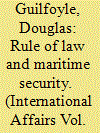

|
|
|
|
|
| Summary/Abstract |
Does the rule of law matter to maritime security? One way into the question is to examine whether states show a discursive commitment that maritime security practices must comply with international law. International law thus provides tools for argument for or against the validity of certain practices. The proposition is thus not only that international law matters to maritime security, but legal argument does too. In this article, these claims will be explored in relation to the South China Sea dispute. The dispute involves Chinese claims to enjoy special rights within the ‘nine-dash line’ on official maps which appears to lay claim to much of the South China Sea. Within this area sovereignty remains disputed over numerous islands and other maritime features. Many of the claimant states have engaged in island-building activities, although none on the scale of China. Ideas matter in such contests, affecting perceptions of reality and of what is possible. International law provides one such set of ideas. Law may be a useful tool in consolidating gains or defeating a rival's claims. For China, law is a key domain in which it is seeking to consolidate control over the South China Sea. The article places the relevant Chinese legal arguments in the context of China's historic engagement with the law of the sea. It argues that the flaw in China's approach has been to underestimate the extent to which it impinges on other states' national interests in the maritime domain, interests they conceptualize in legal terms.
|
|
|
|
|
|
|
|
|
|
|
|
|
|
|
|
| 10 |
ID:
168419
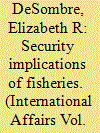

|
|
|
|
|
| Summary/Abstract |
Although frequently ignored in discussion of ocean security, fisheries have had central security implications throughout history. This article re-centres fisheries issues as both a cause and effect of security conflicts, and examines the implications of this re-framing for addressing this intersection. Underlying the security concerns that arise related to fisheries is depletion of global fish stocks. When stocks are overfished or not well managed, fishing vessels move to other areas, where they are more likely to come into conflict with each other and to threaten vulnerable stocks that some populations rely on, and states will claim or defend more ocean territory. These issues are explored here with four sets of security crises that can be best understood by examining the underlying or contributing aspect of fishery depletion: conflicts over sovereignty of small maritime islands, the rise of Somali maritime piracy, the ‘fish wars’ between otherwise friendly states in the middle and latter parts of the twentieth century, and the human insecurity represented by slavery-like conditions aboard some fishing vessels. Understanding the security implications of fisheries grants new reason and new approaches—ideally multi-jurisdictional, transnational and focused on capacity-building—to better protect fisheries and prevent security threats.
|
|
|
|
|
|
|
|
|
|
|
|
|
|
|
|
| 11 |
ID:
168424


|
|
|
|
|
| Summary/Abstract |
Even though most African states have signed and ratified the Framework Convention on Tobacco Control (FCTC), a global treaty to limit tobacco use, African states have been slow to pass and implement tobacco control policies like regulations on sales, smoke-free environments and taxes. This article examines how the ineffectiveness of local tobacco-control advocacy contributes to this suboptimal outcome. It asserts that the disconnect between the global tobacco-control advocacy network and local advocates shapes this ineffectiveness. With funding and direction predominately from the Bloomberg Initiative, local advocates emulate the funders' goal of achieving quick, measurable policy results. Their reliance on the network drives African advocates to strive to pass legislation, even in difficult political climates, and to remake their agendas when funders change their priorities. They also emulate the network's focus on evidence-based arguments that stress epidemiological data and biomedical interventions, even when this issue frame does not resonate with policy-makers. Financial dependence can draw local advocates into expectations about patronage politics, undermine their ability to make principled arguments, and lead them to downplay the ways that their home country's socioeconomic and cultural contexts affect tobacco use and control. Based on key informant interviews with African advocates, media analysis and the case-studies of Ghana and Tanzania, the article broadens the study of philanthropy in global health, it adds an African perspective to the literature on global health advocacy, and it deepens knowledge on power dynamics between external funders and local actors in the realms of health and development.
|
|
|
|
|
|
|
|
|
|
|
|
|
|
|
|
|
|
|
|
|